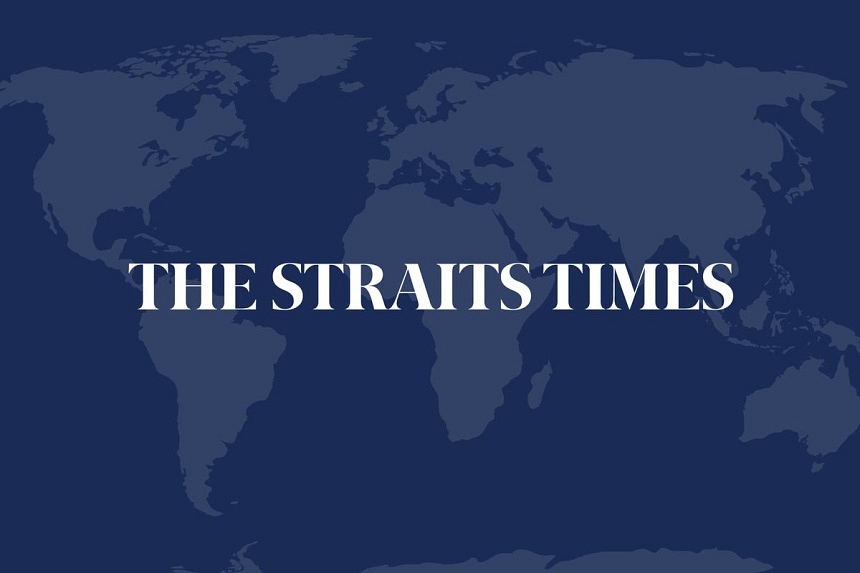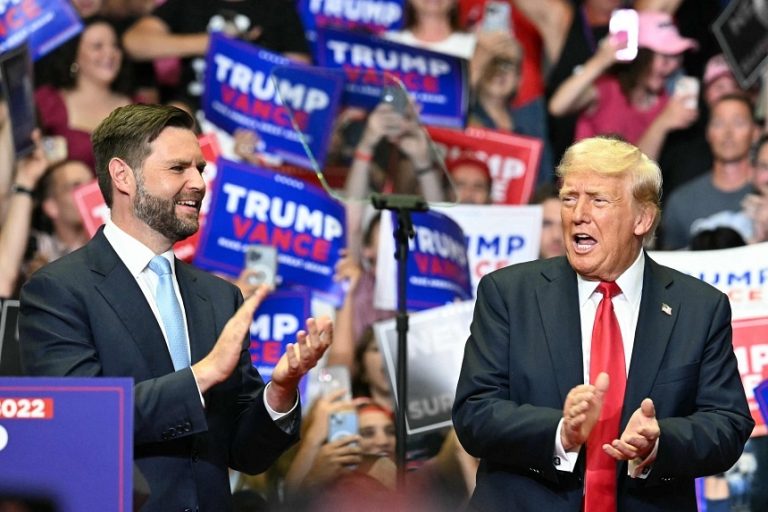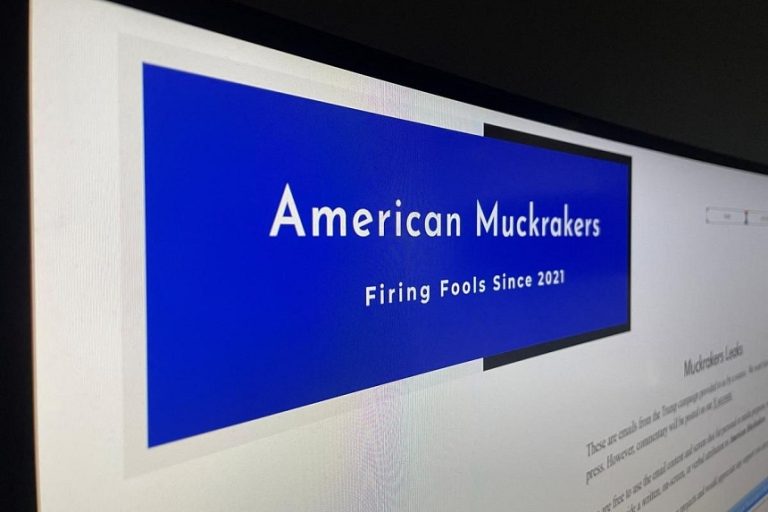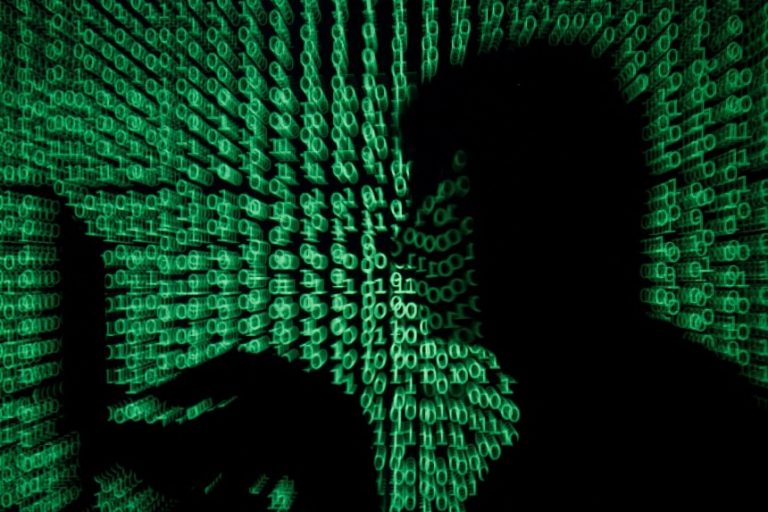
Similar Posts

WASHINGTON – Chinese hackers who tapped into Verizon’s system targeted phones used by Republican presidential candidate Donald Trump and his running mate JD Vance, the New York Times reported on Oct 25, citing people familiar with the matter.
The newspaper said investigators were working to determine what communications, if any, were taken.
The Trump campaign was made aware this week that Trump and Mr Vance were among a number of people inside and outside of government whose phone numbers were targeted through the infiltration of Verizon phone systems, it added.
The campaign did not immediately respond to a request for comment.
The Trump campaign was hacked earlier this year. The US Justice Department charged three members of Iran’s Revolutionary Guards Corps with the hack and trying to disrupt the Nov 5 election. REUTERS

WASHINGTON – The accused Iranian hacking group who intercepted Republican U.S. presidential candidate Donald Trump’s campaign emails have finally found some success in getting their stolen material published after initially failing to interest the mainstream media.
In recent weeks, the hackers began peddling Trump emails more widely to one Democratic political operative, who has posted a trove of material to the website of his political action committee, American Muckrakers, and to independent journalists, at least one of whom posted them on the writing platform Substack. The latest material shows Trump campaign communications with external advisers and other allies, discussing a range of topics leading up to the 2024 election.
The hackers’ activities tracked by Reuters provide a rare glimpse into the operations of an election interference effort. They also demonstrate Iran remains determined to meddle in elections despite a September U.S. Justice Department indictment accusing the leakers of working for Tehran and using a fake persona.
The indictment alleged that an Iranian-government linked hacking group, known as Mint Sandstorm or APT42, compromised multiple Trump campaign staffers between May and June by stealing their passwords. In a Homeland Security advisory published earlier this month, the agency warned that the hackers continue to target campaign staff. If found guilty, they face prison time and fines.
The Department of Justice indictment said the leakers were three Iranian hackers working with Iran’s Basij paramilitary force whose voluntary members help the regime to enforce its strict rules and to project influence. Attempts to reach the hackers identified by name in the indictment via email and text message were unsuccessful.
In conversations with Reuters, the leakers – who collectively use the fake persona “Robert” – did not directly address the U.S. allegations, with one saying “Do you really expect me to answer?!”
“Robert” is the same fake persona referred to in the U.S. indictment, according to FBI emails sent to journalists and reviewed by Reuters.
Iran’s mission to the United Nations said in a statement that reports of the country’s involvement in hacking against the U.S. election were “fundamentally unfounded, and wholly inadmissible,” adding that it “categorically repudiates such accusations.” The FBI, which is investigating Iran’s hacking activity against both presidential campaigns in this election, declined to comment.
David Wheeler, the founder of American Muckrakers, said the documents he shared were authentic and in the public interest. Wheeler said his goal was to “expose how desperate the Trump campaign is to try to win” and to provide the public with factual information. He declined to discuss the material’s origin.
Without making any specific references, the Trump campaign said earlier this month that Iran’s hacking operation was “intended to interfere with the 2024 election and sow chaos throughout our democratic process,” adding any journalists reprinting the stolen documents “are doing the bidding of America’s enemies.”
In 2016, Trump took a different position when he encouraged Russia to hack into Hillary Clinton’s emails and provide them to the press.
LEAK OPERATION
The leak operation started around July when an anonymous email account, [email protected], began communicating with reporters at several media outlets, using the Robert moniker, according to two people familiar with the matter. They initially contacted Politico, the Washington Post and the New York Times, promising damning internal information about the Trump campaign.
In early September, the accused Iranian hackers used a second email address, [email protected], in a fresh round of overtures, including to Reuters and at least two other news outlets, the two people familiar with the matter, said.
At the time, they offered research compiled with public information by the Trump campaign into Republican politicians JD Vance, Marco Rubio and Doug Burgum, all of whom were under consideration as Trump’s running mate.
The vice presidential reports were authentic, a person familiar with the Trump campaign told Reuters. Neither Politico, the Washington Post, the New York Times, nor Reuters published stories based on the reports.
New York Times spokesperson Danielle Rhoades Ha, said the newspaper only published articles based on hacked material “if we find newsworthy information in the materials and can verify them.”
In an email, the Washington Post referred Reuters to past comments made by its executive editor, Matt Murray, who said the episode reflected the fact that news organizations “aren’t going to snap at any hack” provided to them. A spokesperson for Politico said the origin of the documents was more newsworthy than the leaked material. Reuters did not publish this material because the news agency did not believe it was newsworthy, a spokesperson said.
Both AOL email accounts identified by Reuters were taken offline in September by its owner Yahoo, which worked with the FBI before the indictment to trace them to the Iranian hacker group, according to two people familiar with the investigation. Yahoo did not respond to a request for comment.
Before losing email access, Robert suggested reporters might need an alternate contact and offered a telephone number on the encrypted chat application Signal. Signal, which is more difficult to monitor by law enforcement, did not return messages seeking comment.
Some senior U.S. intelligence and law enforcement officials have said that Iran’s interference efforts this election cycle are focused on denigrating Trump as they hold him responsible for the 2020 American drone assassination of former Iranian military general Qassem Soleimani.
Thus far, the already-published leaks do not appear to have changed the public dynamics of the Trump campaign.
MUCKRAKERS
On Sept. 26, North Carolina-based American Muckrakers, began publishing internal Trump campaign emails. Active since 2021, the PAC has a history of publicizing unflattering material about high-profile Republicans. According to public disclosure reports, it is funded through individual, small-dollar donors from around the country.
On its website, American Muckrakers said the leaks came from “a source,” but, ahead of the publication last month, the group publicly asked Robert to get in touch. “HACKER ROBERT, WHY THE F DO YOU KEEP SENDING THE TRUMP INFORMATION TO CORPORATE MEDIA?” the group said in a post to X. “Send it to us and we’ll get it out.”
When asked whether his source was the alleged Iranian persona Robert, Wheeler said “that is confidential” and that he had “no confirmation of the source’s location.” He also declined to comment on whether the FBI had warned him that the communication was the product of a foreign influence operation.
In one example, Muckrakers published material on Oct. 4th purporting to show an unspecified financial arrangement with lawyers representing former Presidential candidate Robert F. Kennedy Jr. and Trump. RFK Jr. attorney Scott Street, said in an email to Reuters he could not speak publicly about the incident. Reuters confirmed the authenticity of the material.
Muckrakers subsequently published documents from Robert about two high-profile races. It included alleged campaign communication about North Carolina Republican gubernatorial candidate Mark Robinson and Florida Republican representative Anna Paulina Luna, both of whom were endorsed by Trump.
The exchange about Robinson concerned an attempt by Republican adviser W. Kirk Bell, to seek guidance from the Trump camp after the scandal over comments attributed to Robinson on a pornographic forum. Robinson has previously denied the comments. The other message came from a Republican adviser sharing information with the campaign about Luna’s personal life.
Robinson and Luna’s campaigns did not return messages seeking comment.
One of the few journalists contacted by Robert who did publish material was independent national security reporter Ken Klippenstein, who posted the vice presidential research documents to Substack late last month. Robert confirmed to Reuters that they gave the material to Klippenstein.
Substack did not respond to a question about its policies concerning hacked material.
After the story, Klippenstein said FBI agents contacted him over his communication with Robert, warning that they were part of a “foreign malign influence operation.” In a post, Klippenstein said the material was newsworthy and he chose to publish it because he believed the news media should not be a “gatekeeper of what the public should know.”
A spokesperson for Reuters, which received similar notifications from the FBI, said, “We cannot comment on our interactions, if any, with law enforcement.” An FBI spokesperson declined to comment on its media notification effort.
Wheeler said he had new leaks in store “soon” and that he would continue to publish similar documents as long as they were “authentic and relevant.” REUTERS

WASHINGTON – Russian hackers are going after US government officials, defence workers and others in a new email phishing campaign targeting thousands of people, according to Microsoft Corp.
The hackers have sent “a series of highly targeted spearphishing emails” to thousands of people in more than 100 organisations since Oct 22, according to a blog post from Microsoft Threat Intelligence published on Oct 29.
The latest campaign will add to mounting concerns over US failures to outwit suspected Russian and Chinese hackers.
The FBI said on Oct 25 it is investigating unauthorised access by Chinese state-affiliated hackers targeting the commercial telecommunications sector.
In some of the emails that were part of the latest campaign, the senders impersonated Microsoft employees, according to the blog.
Spearphishing involves sending tailored emails to individuals, including links to malicious websites that can then steal information.
It wasn’t immediately clear how many of the attacks, if any, were successful.
Microsoft has said the attacks are perpetrated by a sophisticated Russian nation-state group it calls Midnight Blizzard, which US and UK governments have connected to the SVR, the Russian foreign intelligence service.
The company said in January that the group attacked its corporate systems, getting into a “small number” of email accounts, including senior leadership and employees who work in cybersecurity and legal.
In April, US federal agencies were ordered to analyse emails, reset compromised credentials and work to secure Microsoft accounts.
At the time, the Cybersecurity and Infrastructure Security Agency (Cisa) said the incident represented a “grave and unacceptable risk” to agencies, according to the April directive.
Cisa and US State Department didn’t immediately respond to requests for comment.
The Russian Embassy in Washington didn’t immediately respond to a request for comment. BLOOMBERG

WASHINGTON – A previously confidential directive by Biden administration lawyers lays out how military and spy agencies must handle personal information about Americans when using artificial intelligence, showing how the officials grappled with trade-offs between civil liberties and national security.
The results of that internal debate also underscore the constraints and challenges the government faces in issuing rules that keep pace with rapid advances in technology, particularly in electronic surveillance and related areas of computer-assisted intelligence gathering and analysis.
The administration had to navigate two competing goals, according to a senior administration official Joshua Geltzer, the top legal adviser to the National Security Council, “harnessing emerging technology to protect Americans, and establishing guardrails for safeguarding Americans’ privacy and other considerations”.
The White House last month held back the four-page, unclassified directive when President Joe Biden signed a major national security memo that pushes military and intelligence agencies to make greater use of AI within certain guardrails.
After inquiries from The New York Times, the White House has made the guidance public. A close read and an interview with Mr Geltzer, who oversaw the deliberations by lawyers from across the executive branch, offers greater clarity on the current rules that national security agencies must follow when experimenting with using AI.
Training AI systems requires feeding them large amounts of data, raising a critical question for intelligence agencies that could influence both Americans’ private interests and the ability of national security agencies to experiment with the technology.
When an agency acquires an AI system trained by a private sector firm using information about Americans, is that considered “collecting” the data of those Americans?
The guidance says that does not generally count as collecting the training data – so those existing privacy-protecting rules, along with a 2021 directive about collecting commercially available databases, are not yet triggered.
Still, the Biden team was not absolute on that question. The guidance leaves open the possibility that acquisition might count as collection if the agency has the ability to access the training data in its original form, “as well as the authorisation and intent to do so.” NYTIMES
The World Health Organisation (WHO) and some 50 countries issued a warning on Nov 8 at the United Nations about the rise of ransomware attacks against hospitals, with the United States specifically blaming Russia.
Ransomware is a type of digital blackmail in which hackers encrypt the data of victims – individuals, companies or institutions – and demand money as a “ransom” in order to restore it.
Such attacks on hospitals “can be issues of life and death,” according to WHO head Tedros Adhanom Ghebreyesus, who addressed the UN Security Council during a meeting on Nov 8 called by the United States.
“Surveys have shown that attacks on the healthcare sector have increased in both scale and frequency,” Dr Ghebreyesus said, emphasising the importance of international cooperation to combat them.
“Cybercrime, including ransomware, poses a serious threat to international security,” he added, calling on the Security Council to consider it as such.
A joint statement co-signed by over 50 countries – including South Korea, Ukraine, Japan, Argentina, France, Germany and the United Kingdom – offered a similar warning.
“These attacks pose direct threats to public safety and endanger human lives by delaying critical healthcare services, cause significant economic harm, and can pose a threat to international peace and security,” read the statement, shared by US Deputy National Security Advisor Anne Neuberger.
The statement also condemned nations which “knowingly” allow those responsible for ransomware attacks to operate from.
At the meeting, Ms Neuberger directly called out Moscow, saying: “Some states – most notably Russia – continue to allow ransomware actors to operate from their territory with impunity.”
France and South Korea also pointed the finger at North Korea.
Russia defended itself by claiming the Security Council was not the appropriate forum to address cybercrime.
“We believe that today’s meeting can hardly be deemed a reasonable use of the Council’s time and resources,” said Russian ambassador Vassili Nebenzia.
“If our Western colleagues wish to discuss the security of healthcare facilities,” he continued, “they should agree in the Security Council upon specific steps to stop the horrific… attacks by Israel on hospitals in the Gaza Strip.” AFP

WASHINGTON – The mastermind behind one of the biggest-ever Bitcoin heists was ordered to serve five years in prison for conspiring with his social-media rapper wife to launder money he stole by hacking into the Bitfinex exchange and grabbing cryptoassets now worth billions of dollars.
Ilya “Dutch” Lichtenstein was sentenced in Washington on Nov 14, after he and his wife, Heather Morgan, pleaded guilty last year in a scheme to hide proceeds from the 2016 hack. Morgan, known as “Razzlekhan” in her rap videos, will be sentenced Nov 18. The government recommended an 18-month sentence for her.
Lichtenstein, 37, faced as long as 20 years behind bars. But the government cited his substantial assistance that “has benefited numerous investigations.” The Bitfinex hack resulted in the theft of 119,754 Bitcoin worth about US$71 million (S$23 million) at the time. But since then, the token has surged from US$580 in 2016 to more than US$90,000 this week, boosting the value of the assets to billions.
“This is so massive, it is not comparable to other crypto crimes” based on its scale and complexity, US District Judge Colleen Kollar-Kotelly said before sentencing. Lichtenstein carried out his scheme over several years, which undermines defense claims that his actions were “impulsive,” the judge said.
Lichtenstein, a “highly skilled computer expert,” used several hacking techniques to gain access to the Bitfinex network, and then, in August 2016, fraudulently authorised more than 2,000 transactions to move Bitcoin to a cryptocurrency wallet he controlled, the government said.
He and his wife used sophisticated and meticulous money-laundering techniques to hide the stolen proceeds, including setting up accounts under fictitious identities, moving funds in small amounts, and breaking up the trail of transactions by depositing and withdrawing funds from crypto exchanges and darknet markets. They bought nonfungible tokens, gold and Walmart gift cards, according to the government.
Lichtenstein “became one of the greatest money launderers that the government has encountered in the cryptocurrency space,” prosecutors wrote in an October sentencing memo. “If the defendant were to take what he has learned from this prosecution and incorporate it into a future money laundering scheme, he would be even better-equipped to conceal his activity while monetizing his crimes,” they wrote.
Since his plea last year, Lichtenstein has assisted the government in other criminal cases, including as a government witness in a money-laundering trial involving a mixing service called Bitcoin Fog.
Other hacks
While Lichtenstein had no official criminal history before his arrest in 2022, the Bitfinex hack wasn’t his first, the government said. As a juvenile, he experimented with hacking and financial fraud, and around 2015, he illegally transferred a small amount of PayCoin, an alternative form of virtual currency, prosecutors said. The following year, he stole about US$200,000 from a virtual currency exchange, the government said.
But he also worked in legitimate businesses. While in college, Lichtenstein ran a digital marketing agency from his dorm, and after graduation, a software company he co-founded grew to 30 employees, the government said.
“His decision to use his skills for criminal ends is thus particularly disappointing, but it gives hope for continued successful rehabilitation,” prosecutors said in the sentencing memo.
Morgan attended her husband’s sentencing, along with Lichtenstein’s family. Lichtenstein expressed remorse to the judge and pledged that he would use his skills to help with cybersecurity. “I can make a real difference in the fight against cybercrime,” he said.
He asked that his wife avoid prison time. “Heather is only involved in this case because of me,” he said. BLOOMBERG
